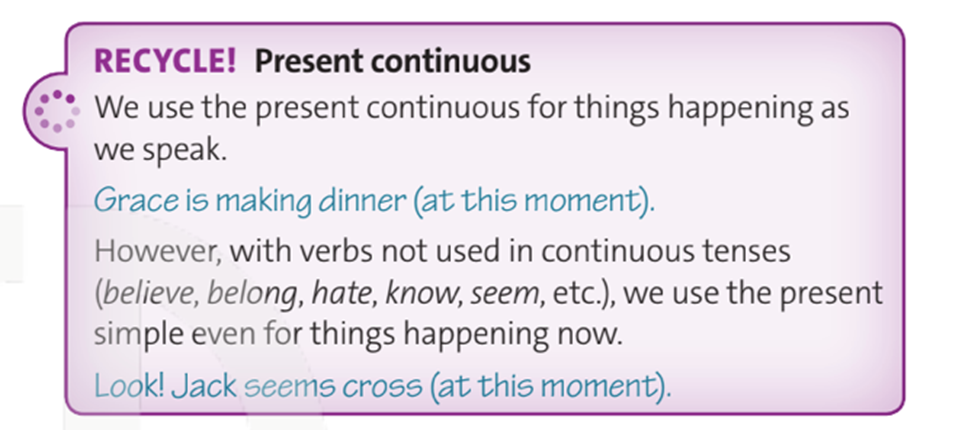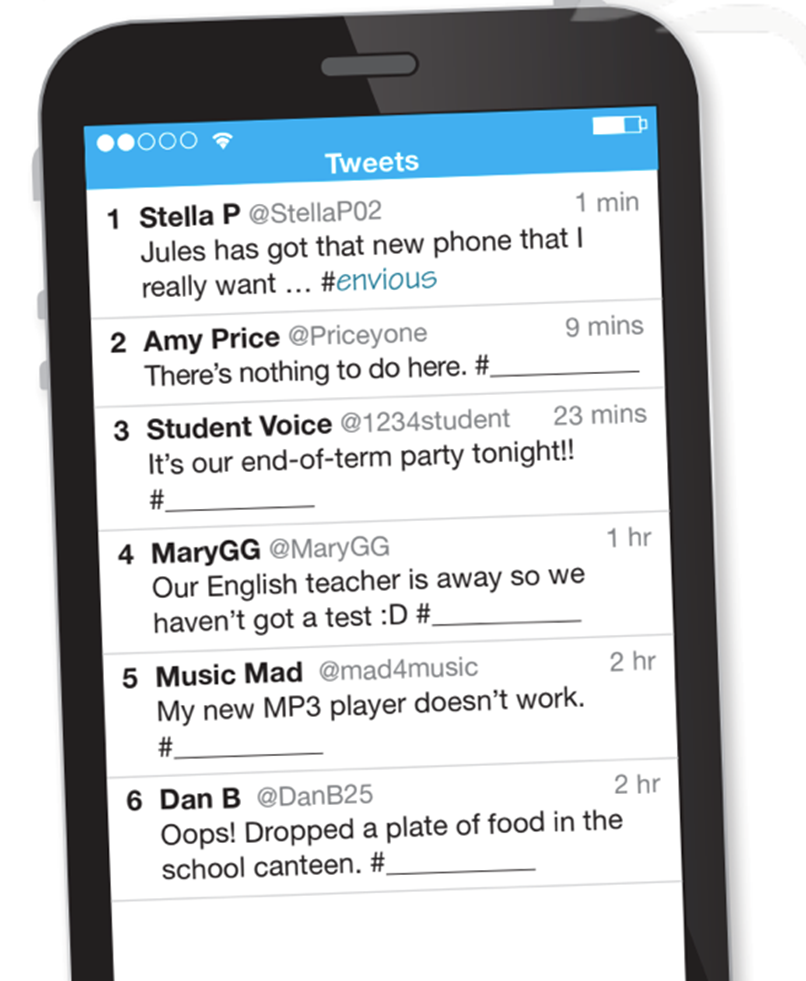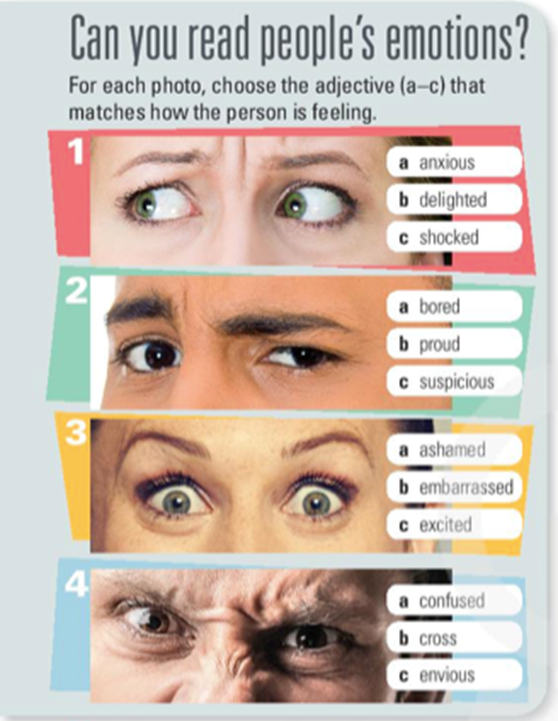Câu hỏi:
23/07/2024 352
Listen and repeat. Pay attention to the ending sounds. (Nghe và nhắc lại. Chú ý đến các âm kết thúc)
shame
/ʃeɪm/
bore
/bɔːr/
confuse
/kənˈfjuːz/
delight
/dɪˈlaɪt/
embarrass
/ɪmˈber.əs/
excite
/ɪkˈsaɪt/
frighten
/ˈfraɪ.tən/
relieve
/rɪˈliːv/
shock
/ʃɑːk/
Say the words. Decide if the endings are pronounced /id/, /d/ or /t/. Listen again and check. (Đọc các từ xem âm cuối được phát âm /id/, /d/ hay /t/. Nghe và kiểm tra lại)
Listen and repeat. Pay attention to the ending sounds. (Nghe và nhắc lại. Chú ý đến các âm kết thúc)
|
shame
|
/ʃeɪm/ |
bore
|
/bɔːr/
|
|
confuse
|
/kənˈfjuːz/
|
delight
|
/dɪˈlaɪt/
|
|
embarrass
|
/ɪmˈber.əs/
|
excite
|
/ɪkˈsaɪt/
|
|
frighten
|
/ˈfraɪ.tən/
|
relieve
|
/rɪˈliːv/
|
|
shock
|
/ʃɑːk/
|
|
|
Say the words. Decide if the endings are pronounced /id/, /d/ or /t/. Listen again and check. (Đọc các từ xem âm cuối được phát âm /id/, /d/ hay /t/. Nghe và kiểm tra lại)
Trả lời:
 Giải bởi Vietjack
Giải bởi Vietjack
- /id/: delighted, excited
- /d/: bored, frightened, relieved
- /t/: confused, embarrassed, shocked
- /id/: delighted, excited
- /d/: bored, frightened, relieved
- /t/: confused, embarrassed, shocked
CÂU HỎI HOT CÙNG CHỦ ĐỀ
Câu 1:
Read the Recycle! box. Then listen again and complete the sentences (a-d) with speakers 1-4 and the correct present tense form of the verbs in brackets. (Đọc bảng Recycle! Nghe lại và hoàn thành câu a-d với các tính từ 1-4 và dạng đúng trong ngoặc của động từ ở thì hiện tại)

Read the Recycle! box. Then listen again and complete the sentences (a-d) with speakers 1-4 and the correct present tense form of the verbs in brackets. (Đọc bảng Recycle! Nghe lại và hoàn thành câu a-d với các tính từ 1-4 và dạng đúng trong ngoặc của động từ ở thì hiện tại)

Câu 2:
Read the tweets and complete the hashtags with adjectives from exercise 2. (Đọc những bài đăng sau và hoàn thành các # với tình từ ở bài tập 2)

Read the tweets and complete the hashtags with adjectives from exercise 2. (Đọc những bài đăng sau và hoàn thành các # với tình từ ở bài tập 2)

Câu 3:
Speaking. Work in pairs. Ask and answer about the following situations. Sometimes you might need more than one adjectives. (Nói. Làm việc theo cặp. Hỏi và trả lời về các tình huống sau. Đôi khi bạn sẽ cần nhiều hơn một tính từ)

(- Bạn cảm thấy thế nào khi …?
- Tôi thấy phấn khích, nhưng lại hơi lo lắng.)
1. you have an exam in ten minutes?
2. your exam finishes?
3. you see a large spider in your bedroom?
4. your friends or family members are arguing?
5. you arrive at a party?
6. you can't sleep?
Speaking. Work in pairs. Ask and answer about the following situations. Sometimes you might need more than one adjectives. (Nói. Làm việc theo cặp. Hỏi và trả lời về các tình huống sau. Đôi khi bạn sẽ cần nhiều hơn một tính từ)

(- Bạn cảm thấy thế nào khi …?
- Tôi thấy phấn khích, nhưng lại hơi lo lắng.)
1. you have an exam in ten minutes?
2. your exam finishes?
3. you see a large spider in your bedroom?
4. your friends or family members are arguing?
5. you arrive at a party?
6. you can't sleep?
Câu 4:
Listen to four speakers. Match one adjective from the list below with each speaker (1-4). There are four extra adjectives. (Lắng nghe bốn người nói. Nối một tính từ với mỗi người. Có bốn tính từ được cho thêm)
Listen to four speakers. Match one adjective from the list below with each speaker (1-4). There are four extra adjectives. (Lắng nghe bốn người nói. Nối một tính từ với mỗi người. Có bốn tính từ được cho thêm)
Câu 5:
Vocabulary. Check the meaning of all the adjectives below. Can you match any of them with the photos in exercise 1? (Từ vựng. Kiểm tra lại nghĩa của các tính từ sau. Nối chúng với ảnh ở bài tập 1)
Adjectives to describe feelings (Các tính từ miêu tả cảm xúc)
anxious: lo lắng
ashamed: xấu hổ
cross: cáu
delighted: vui mừng
envious: ghen tị
excited: phấn khích
relieved: khuây khoả
shocked: sốc
bored: chán
confused: bối rối
disappointed: thất vọng
embarrassed: ngại ngùng
frightened: sợ hãi
proud: tự hào
suspicious: nghi ngờ
upset: thất vọng
Vocabulary. Check the meaning of all the adjectives below. Can you match any of them with the photos in exercise 1? (Từ vựng. Kiểm tra lại nghĩa của các tính từ sau. Nối chúng với ảnh ở bài tập 1)
Adjectives to describe feelings (Các tính từ miêu tả cảm xúc)
|
anxious: lo lắng |
ashamed: xấu hổ |
|
cross: cáu |
delighted: vui mừng |
|
envious: ghen tị |
excited: phấn khích |
|
relieved: khuây khoả |
shocked: sốc |
|
bored: chán |
confused: bối rối |
|
disappointed: thất vọng |
embarrassed: ngại ngùng |
|
frightened: sợ hãi |
proud: tự hào |
|
suspicious: nghi ngờ |
upset: thất vọng |
Câu 6:
Work in pairs. Put the adjectives in exercise 2 into categories below. Do you know any other adjectives you could add to the categories? (Làm việc theo cặp, xếp các tính từ ở bài tập 2 vào các loại dưới dây. Em có biết tính từ nào thêm được vào đó không?
Câu 7:
Speaking. Look at the photos and answer the questions. (Nói. Nhìn tranh và trả lời câu hỏi)

Speaking. Look at the photos and answer the questions. (Nói. Nhìn tranh và trả lời câu hỏi)

Câu 8:
In pairs, do the quiz below. How many did you get right? (Trả lời câu hỏi theo cặp. Các em có thể trả lời đúng bao nhiêu câu?)
(Bạn có thể đọc được cảm xúc không?
Với mỗi bức tranh, hãy chọn các tính từ (a-c) khớp với biểu cảm khuôn mặt)

In pairs, do the quiz below. How many did you get right? (Trả lời câu hỏi theo cặp. Các em có thể trả lời đúng bao nhiêu câu?)
(Bạn có thể đọc được cảm xúc không?
Với mỗi bức tranh, hãy chọn các tính từ (a-c) khớp với biểu cảm khuôn mặt)



